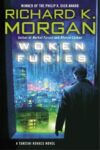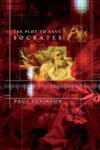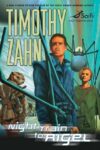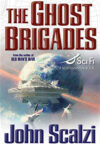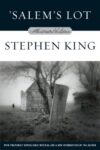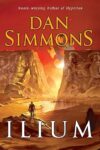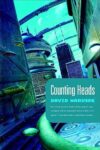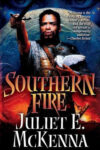Waiting to meet a friend for lunch the other day, I stood outside a restaurant in Manhattan’s TriBeCa with my face buried in Woken Furies, the latest book from Richard K. Morgan. The restaurant manager spotted me reading and approached me eagerly: “Is that the new Takeshi Kovacs?” The funny part is, this was the second time I’d been approached by a rabid fan while reading one of Morgan’s books.
Review: “Four and Twenty Blackbirds” by Cherie Priest
Cherie Priest’s debut novel, this atmospheric Southern Gothic ghost story was originally published by a small regional press in 2003. The (shorter) new edition from Tor is an indication that greater things lie ahead for this new voice in fiction. A sequel, Wings to the Kingdom, is due from Tor in the fall, and I wouldn’t be surprised if the publisher sees a potential franchise here. Heck, I could see this showing up on the new CW network. If you like ghost stories with more texture than genuine twists, Four and Twenty Blackbirds is worth a look.
Review: “The Making of a Graphic Novel/The Resonator” by Prentis Rollins
This is one of those ideas that seems so obvious you wonder why it hasn’t been done before. Writer-artist Rollins, who’s worked extensively for DC Comics, splits his book in half.
Review: “Light” by M. John Harrison
What makes Light so special, and so very much worth your attention, is that no matter how “far out” Harrison takes things—very far out indeed, if you’re wondering—he remains primarily concerned with human stories, human dilemmas. There are three main characters in this book who (almost) never interact in the course of the story, though their lives are all intertwined and eventually come together.
Review: “7th Son” by J.C. Hutchins
Attention all you Earth-crack junkies out there. J. C. Hutchins’s 7th Son podcast novel is well worth checking out. It’s a taut, tense scifi thriller that’s got me hooked after only a few episodes.
Review: “The Plot to Save Socrates” by Paul Levinson
Levinson, author of The Silk Code and The Consciousness Plague, among others novels, brings us one of the more peculiar time travel books I’ve read. In it, a group of time travellers brought together by forces unknown—and you never really find out whom—conspire to rescue Socrates from hemlock poisioning at the hands of the Athenian democracy, bringing him to the future for the benefit of all mankind.
Review: “Night Train to Rigel” by Timothy Zahn
Timothy Zahn’s a prolific writer with many succesful books both in his own and in other people’s universes.
What’s more, his name makes him eminently suited to be a bad guy in a Star Wars movie himself.
Darth Zahn’s latest book, Night Train to Rigel, delivers why-didn’t-I-think-of-that clever ideas and a zippy plotline that kept me flipping paper to the end.
Review: “The Prestige” by Christopher Priest
This is an odd, hard to define, impossible to put down book, first published in 1995, but out in a new paperback edition. The reason I’m bringing it to your attention is primarily due to news of an upcoming film: Christopher Nolan, director of Batman Begins and one of my personal favorites, Memento, will begin shooting an adaptation of The Prestige this month.
Review: “The Ghost Brigades” by John Scalzi
Ghost Brigades is a pageturner with surprising emotional rewards, but I’m hoping that Scalzi plans to write more books in this universe, because as it is there are too many ideas here for his own good.
Review: “Platinum Pohl: The Collected Best Stories”
I’d never read Pohl before dipping into Platinum Pohl, but now I find myself eager to expand my Pohl-ian horizons. This is Grand Master science fiction at its finest. Each one of the stories in here is a gem, a well-crafted little machine.
Review: “‘Salem’s Lot: Illustrated Edition” by Stephen King
To commemorate the 30th anniversary of the publication of Stephen King’s classic horror novel ‘Salem’s Lot, Doubleday is publishing a new edition of the book in hardcover that includes black-and-white illustrations, a new introduction, fifty pages of additional material deleted from the original manuscript, and two short stories related to events in the novel.
Review: “Ilium” by Dan Simmons
This is an odd book. Simmons envisions a solar system several thousand years in the future. Earth is practically uninhabited—a few hundred thousand “old-style” humans are all that is left of us. So-called “post-humans” left the planet long ago for cities built on asteroids in orbit. The “old-style” humans are each allotted one hundred years of life, at which point they are faxed (quantum teleported) to the rings to live forever with the post-humans. Or so the ordinary humans believe.
Review: “Counting Heads” by David Marusek
Marusek has envisioned his world so clearly and carefully that the technical details feel like afterthoughts. References are made subtly and in passing, the way any of us would refer to a ubiquitous convenience like a cellphone or digital camera, and it takes you many pages to get a full glimpse of how this future society truly differs from our own, while remaining completely human and recognizable.
Review: “Someone Comes to Town, Someone Leaves Town” by Cory Doctorow
This is a book that will appeal mostly to geeks, both because it’s SF and because it dwells so enthusiastically on the topic of wireless connectivity and networks and all that. But above and beyond those trappings, Someone Comes to Town, Someone Leaves Town is about family and society: fitting in, feeling left out, struggling for acceptance, struggling for independence.
Review: “Southern Fire” by Juliet McKenna
Juliet McKenna is the thinking fantasy reader’s author, the kind who dreams up fantasy elements and then works out the implications of those elements with the precision and thoughtfulness of a scientist, or, well, an SF writer. It’s clear throughout Southern Fire that McKenna is spinning her tale out of a deep, rich, internally consistent tapestry of details and textures.

